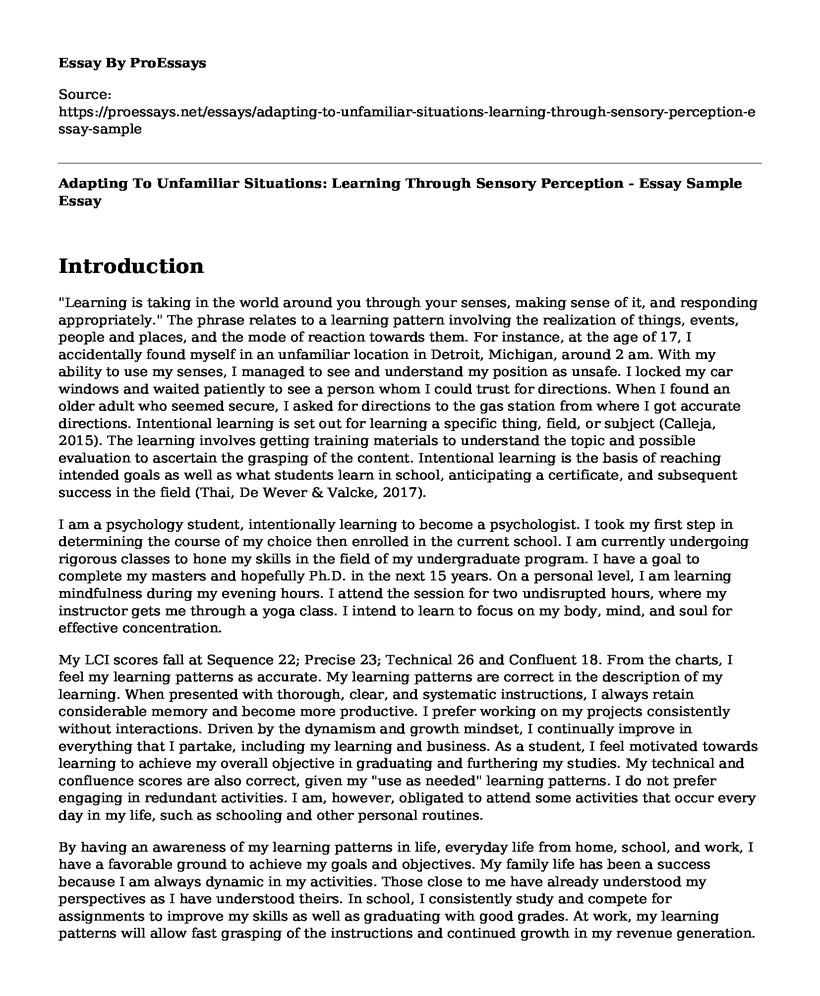Introduction
"Learning is taking in the world around you through your senses, making sense of it, and responding appropriately." The phrase relates to a learning pattern involving the realization of things, events, people and places, and the mode of reaction towards them. For instance, at the age of 17, I accidentally found myself in an unfamiliar location in Detroit, Michigan, around 2 am. With my ability to use my senses, I managed to see and understand my position as unsafe. I locked my car windows and waited patiently to see a person whom I could trust for directions. When I found an older adult who seemed secure, I asked for directions to the gas station from where I got accurate directions. Intentional learning is set out for learning a specific thing, field, or subject (Calleja, 2015). The learning involves getting training materials to understand the topic and possible evaluation to ascertain the grasping of the content. Intentional learning is the basis of reaching intended goals as well as what students learn in school, anticipating a certificate, and subsequent success in the field (Thai, De Wever & Valcke, 2017).
I am a psychology student, intentionally learning to become a psychologist. I took my first step in determining the course of my choice then enrolled in the current school. I am currently undergoing rigorous classes to hone my skills in the field of my undergraduate program. I have a goal to complete my masters and hopefully Ph.D. in the next 15 years. On a personal level, I am learning mindfulness during my evening hours. I attend the session for two undisrupted hours, where my instructor gets me through a yoga class. I intend to learn to focus on my body, mind, and soul for effective concentration.
My LCI scores fall at Sequence 22; Precise 23; Technical 26 and Confluent 18. From the charts, I feel my learning patterns as accurate. My learning patterns are correct in the description of my learning. When presented with thorough, clear, and systematic instructions, I always retain considerable memory and become more productive. I prefer working on my projects consistently without interactions. Driven by the dynamism and growth mindset, I continually improve in everything that I partake, including my learning and business. As a student, I feel motivated towards learning to achieve my overall objective in graduating and furthering my studies. My technical and confluence scores are also correct, given my "use as needed" learning patterns. I do not prefer engaging in redundant activities. I am, however, obligated to attend some activities that occur every day in my life, such as schooling and other personal routines.
By having an awareness of my learning patterns in life, everyday life from home, school, and work, I have a favorable ground to achieve my goals and objectives. My family life has been a success because I am always dynamic in my activities. Those close to me have already understood my perspectives as I have understood theirs. In school, I consistently study and compete for assignments to improve my skills as well as graduating with good grades. At work, my learning patterns will allow fast grasping of the instructions and continued growth in my revenue generation. As such, if I employ my learning patterns such as Sequence, Precise, Technical, and Confluent; I will become successful in life in achieving the desires of my heart.
References
Calleja, C. (2015). The Let Me Learn Process: A Robust Theory with Practical Implications. In Horizons-Forum on Learning Publication. A Learning Paradigm Informed by Knowledge of the Learning Self. A Compendium of Applied Research on the Let Me Learn Process (p. 2945).
Thai, N. T., De Wever, B., & Valcke, M. (2017). The impact of a flipped classroom design on learning performance in higher education: Looking for the best "blend" of lectures and guiding questions with feedback. Computers & Education, 107, 113-126.
Cite this page
Adapting To Unfamiliar Situations: Learning Through Sensory Perception - Essay Sample. (2023, Feb 21). Retrieved from https://proessays.net/essays/adapting-to-unfamiliar-situations-learning-through-sensory-perception-essay-sample
If you are the original author of this essay and no longer wish to have it published on the ProEssays website, please click below to request its removal:
- Admission Essay Sample for Master of Journalism - Carleton University
- The Perspective of Undergraduate Students as It Relates to Workplace Bullying
- Jobs or Occupations That My Family Members and I Have Held. Essay Example.
- Essay Sample on Deviance and Social Norm
- The Role of Classroom Environment on Cognitive Development of Children
- Essay Sample on Love in 21st Century: Crawling Back to Reality?
- Bussing Program Beneficial to Unrepresented Minorities: Rose Place Case Study







